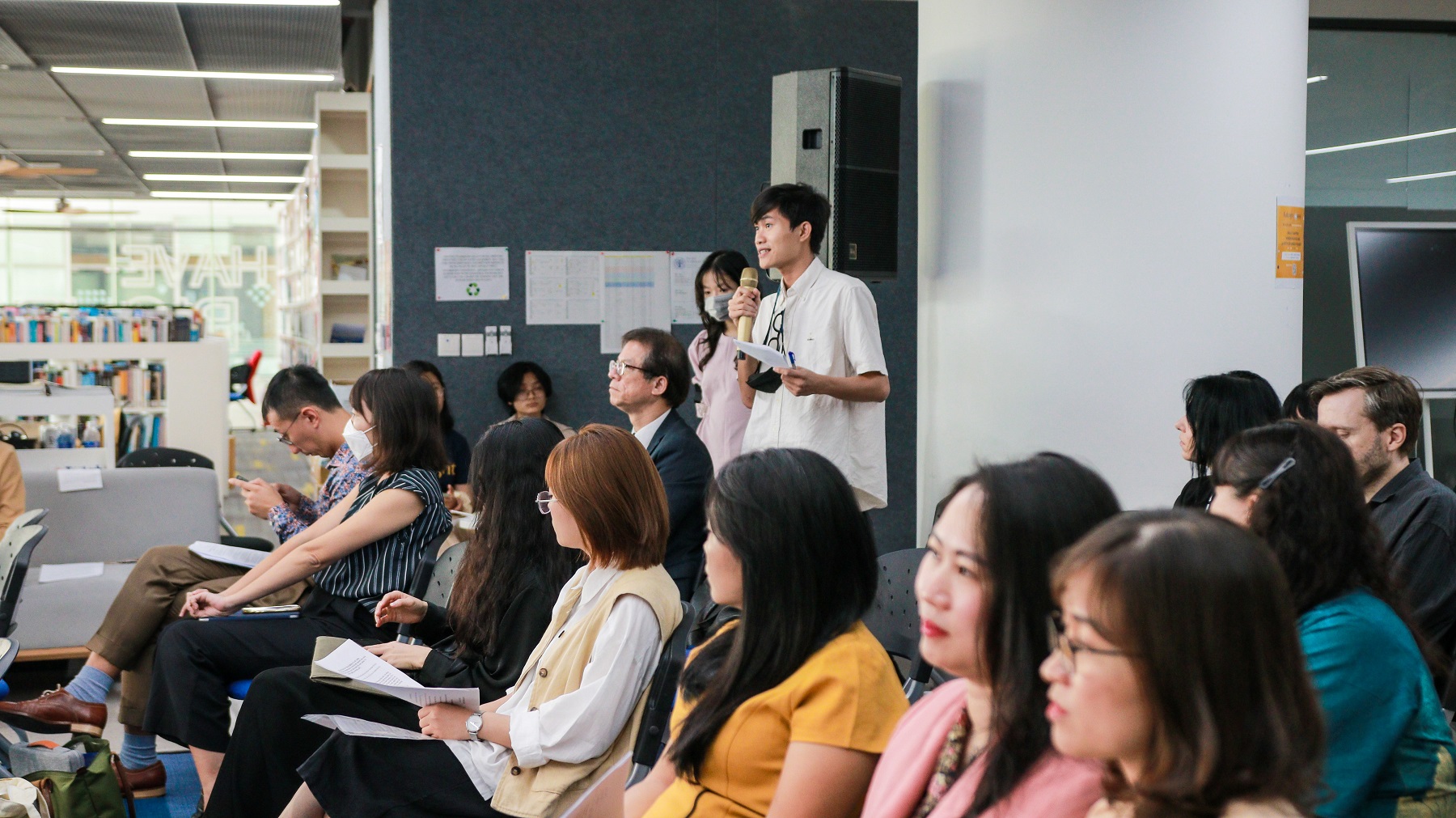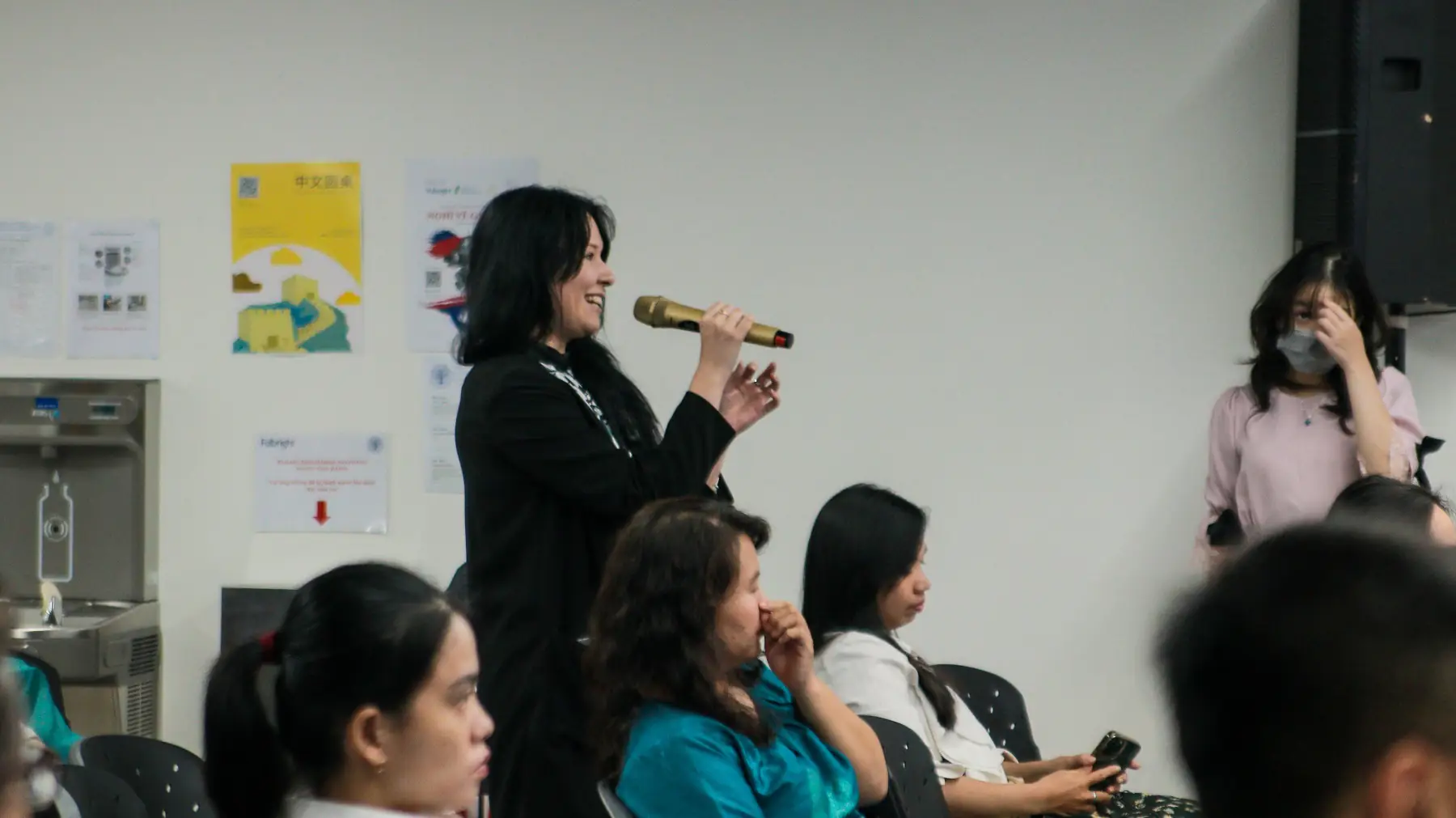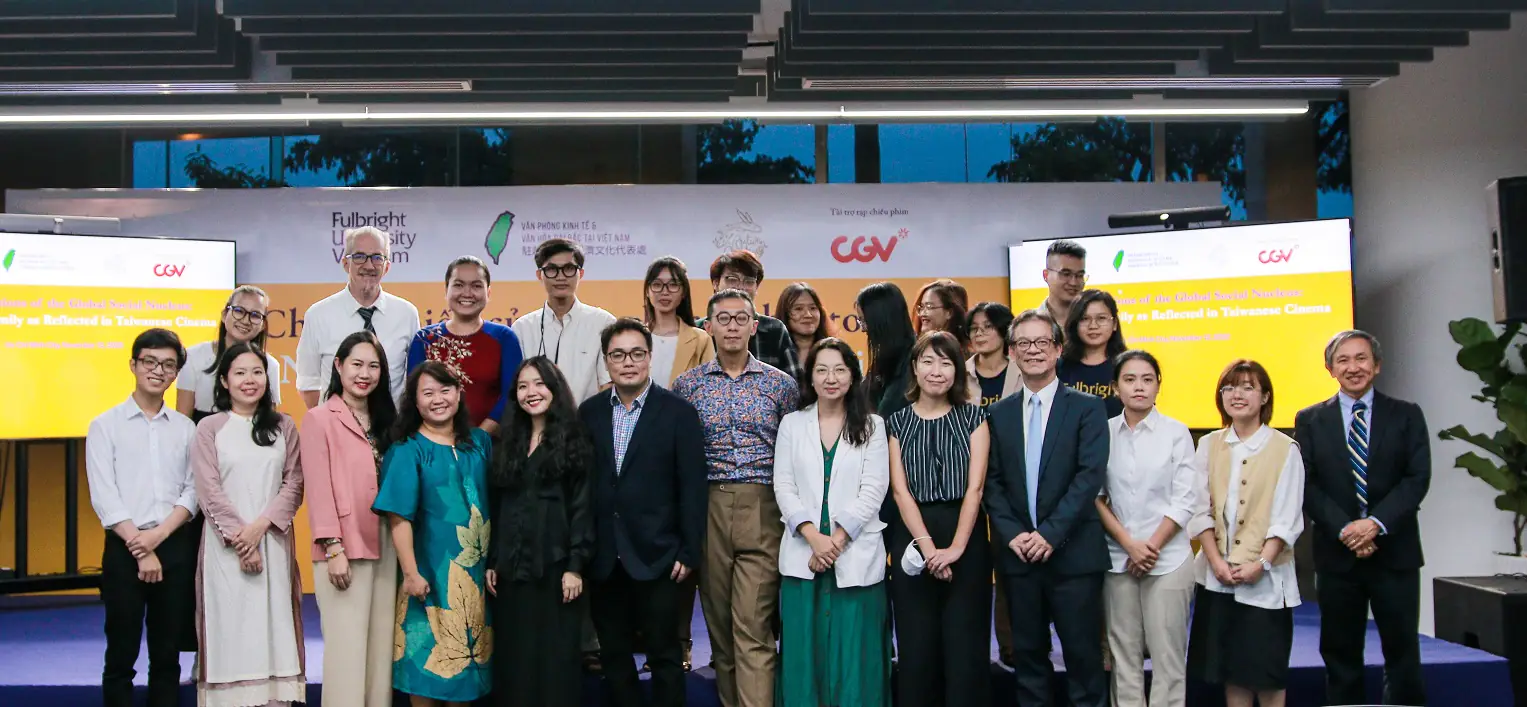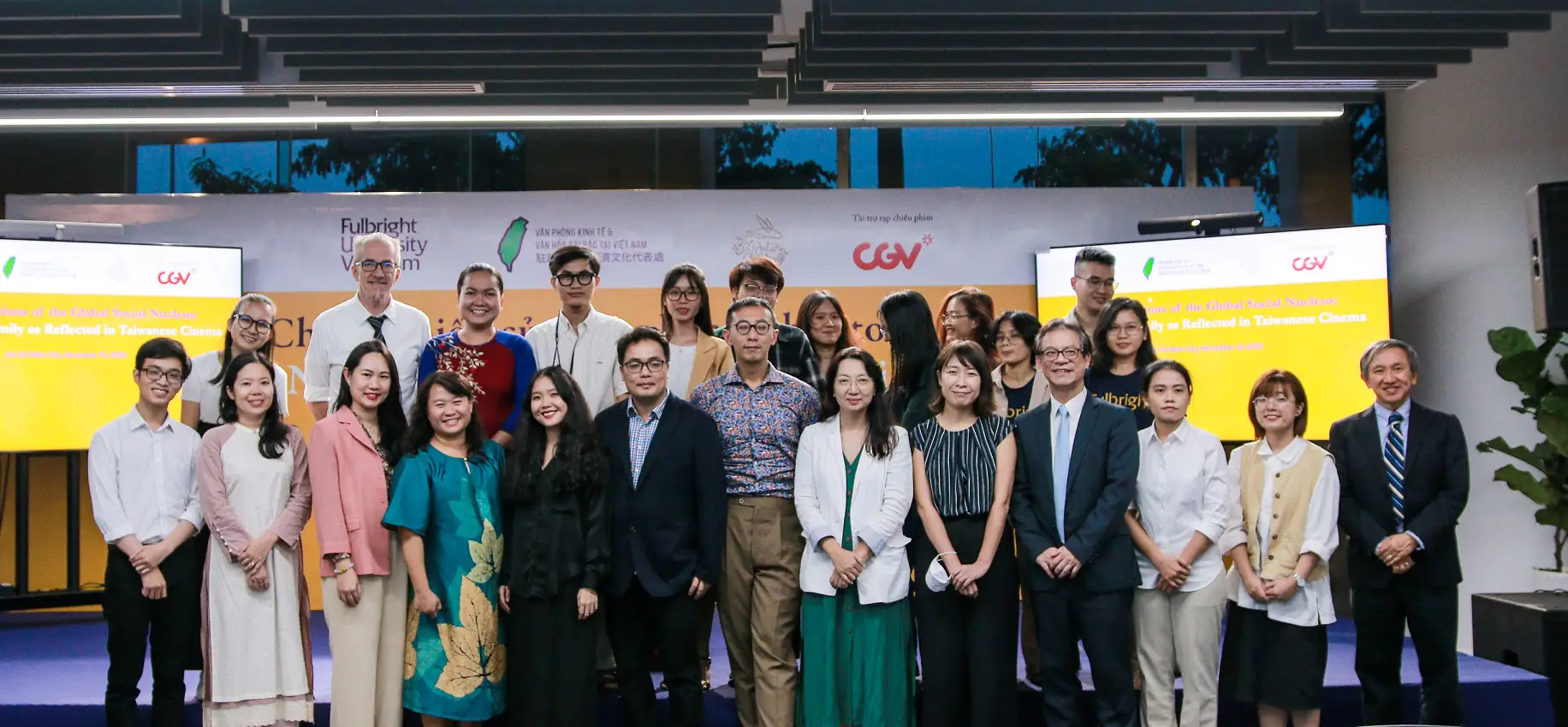
“Transformations of the Global Social Nucleus: Thoughts on Family as Reflected in Taiwanese Cinema” was the main theme of the round-table conference hosted by Fulbright University Vietnam in collaboration with the organizers of Autumn Meeting. The conference offered an array of papers both rich and revelatory on some of Taiwan’s most iconic films recognized not only on the regional and global cinematic stage, but also adored by the most ardent of cinephiles.
Prior to the conference which took place on November 12 at Fulbright’s campus, the general public, filmmakers, critics and scholars were treated to the screenings of three of the films widely considered as iconic and exemplary of Taiwanese cinema. They were “Dust in the Wind” (1986) by Hou Hsiao-hsien, “The Rebels of the Neon God” (1992) by Tsai Ming-liang, and “Eat Drink Man Woman” (1994) by Ang Lee. Conducted at the Crescent Mall branch (District 7, HCMC) of CGV, the largest film distributor and cinema operator in Vietnam, the screenings served as a poetic prologue, or a modest preface, to the issues about to be unfolded and expounded at the conference.
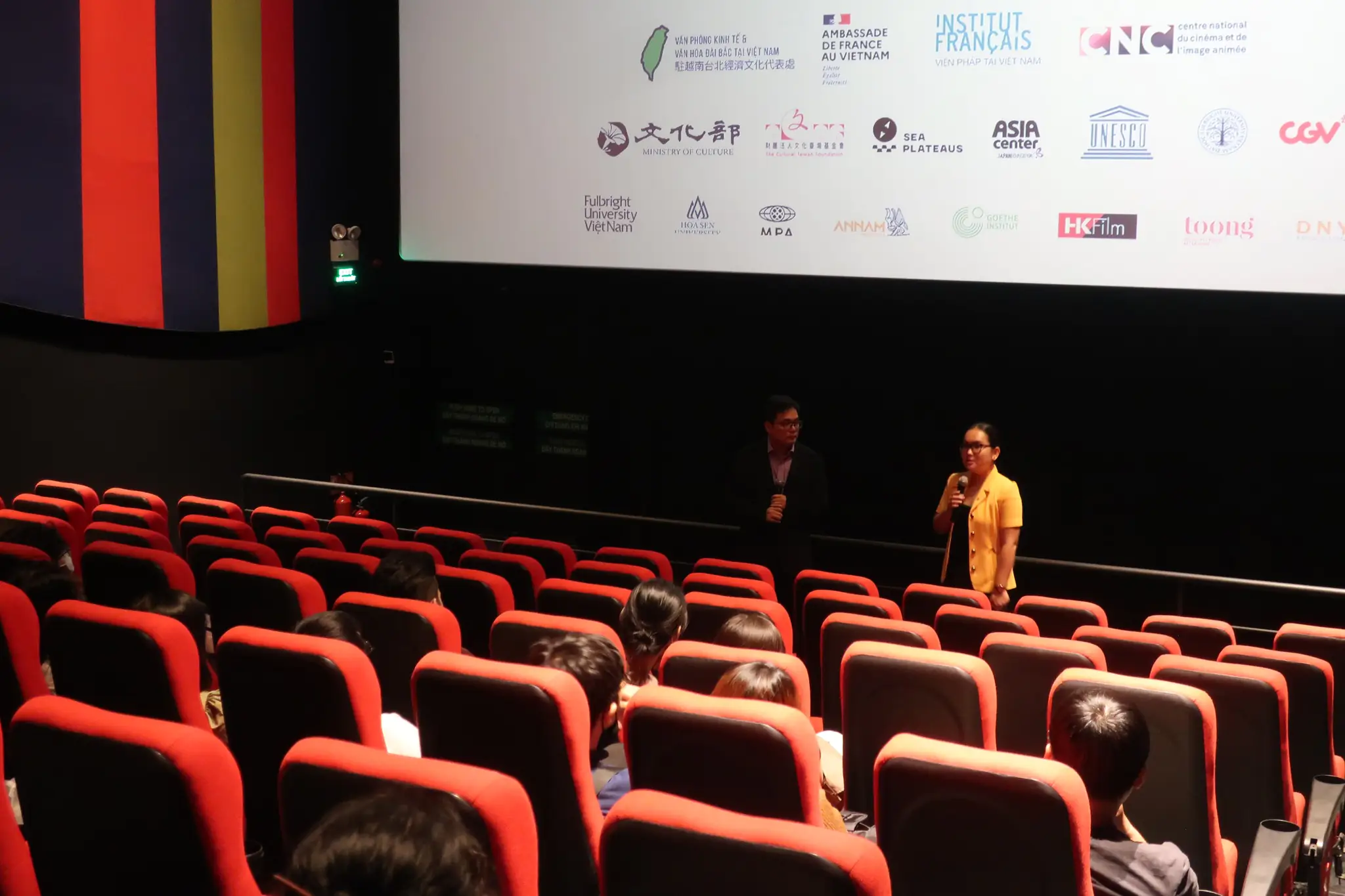
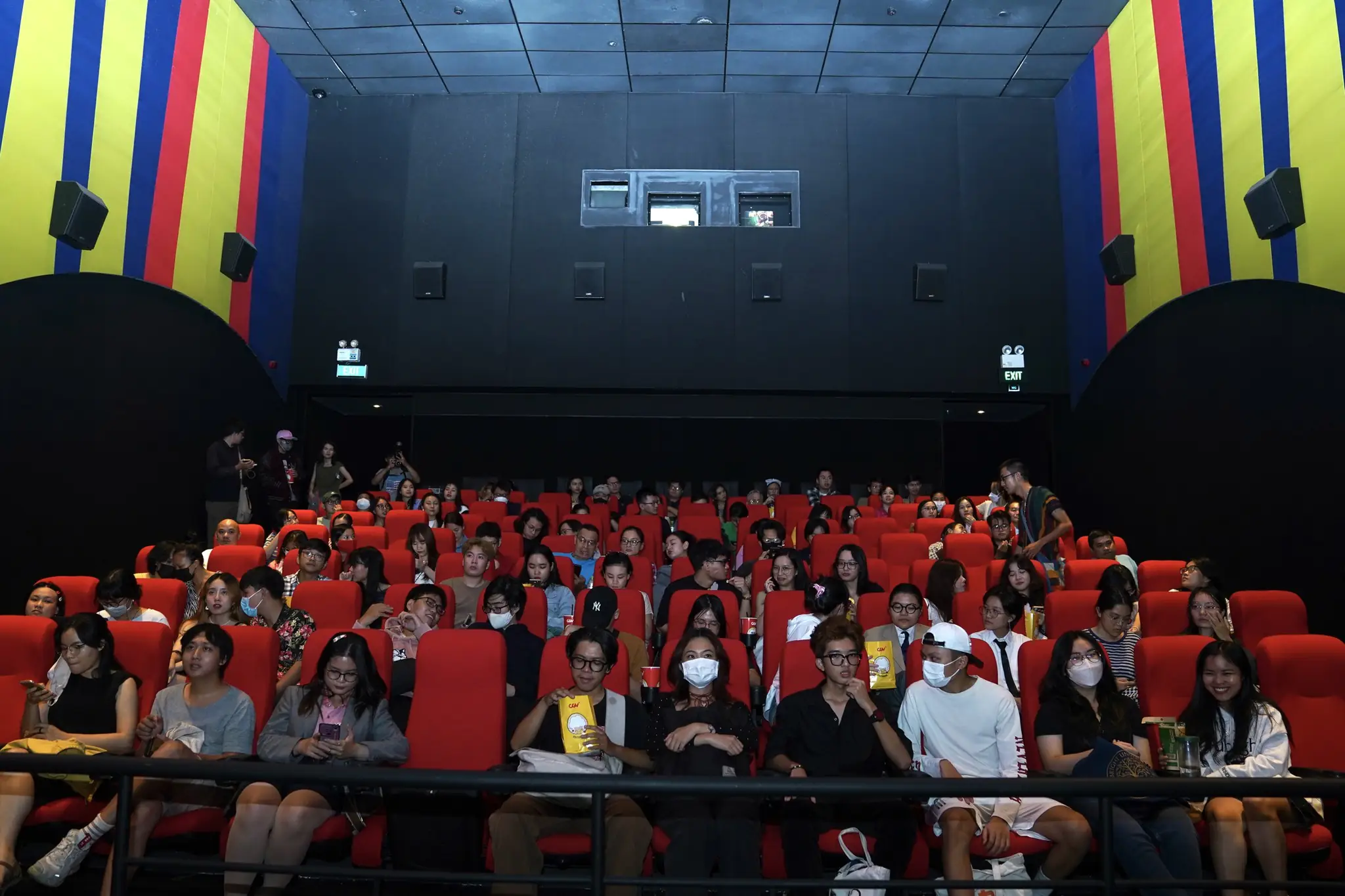
With 13 papers from Vietnamese, American and Taiwanese scholars, the round-table conference raised, proffered, and analyzed multifaceted issues on the notion of family in contemporary times, as portrayed through the lens of cinema. While the films under discussion were placed and centered on local lives amid Taiwan’s specific historical, cultural and social contexts, they all touch on humane questions that appeal to any communities or societies in our contemporary world, which in turn, suggest potential solutions to restabilize “family” as the nucleus of society.
The disintegration, defiance, and breaking down of societal hierarchical structure

Professor John Hutnyk (Tôn Đức Thắng University) presenting his paper “What might we learn from the family portrait as prisonscape?”
In her article, titled “Prisonscapes: Scenes from the Carceral Frontier” (2016), the American scholar Dana Greene explains, “These prisonscapes, a term I coined that marries the artistic tradition of landscape imagery with my aim to place prisons in a material and geographical context, reveal concealed truths, challenge myths, and pave pathways for empathetic informed socio-political awakenings”. Inspired by Professor John Hutnyk’s paper (Ton Duc Thang University), viewers of a family portrait that sets all members standing still in front of the camera can find it as a prisonscape that keeps them there forever in the static hierarchical order of their time when the photo was taken. However, if people look deeper into each visage, the outfits, or poses of everyone in the time-frozen picture, they may be able to read out both positive and negative aspects that those standing-still figures are presenting and concealing.
Dr. Ho Khanh Van (University of Social Sciences and Humanities, HCMC) and her interpretation of Tsai Ming-liang’s movies indicates the filmmaker’s viewpoint on the divarication of familial relations from an existentialist perspective, which turns family members into isolated creatures and lonely human beings. According to Dr. Khanh Van, Tsai’s understanding of human creatures is not as a social being conditioned by communal criteria or conventions, but rather a human being with his/her/their inherited freedom. This undoubtedly leads to the formation of rebellious, anti-conventional characters who break through any extant familial or societal frameworks in Tsai’s movies.
A search for inwardness
Often identified as the director’s semi-autobiography, “A Time to Live, a Time to Die” (1985) by Hou Hsiao-hsien is a journey back to the director’s childhood to search for the “original nature” (benlai mianmu 本來面目) of a person, and reconstruct his growth-up as a consequence infected by specific historical, socio-cultural and political environments. According to Ms. Nguyen Khac Ngan Vy (Fudan University, Shanghai, China), Hou’s extroverted shots represent not only various viewpoints of characters in the film, but also the director’s subjective introverted points of view.

Ms. Nguyen Khac Ngan Vy (Fudan University, Shanghai, China)
In the same vein, members of a family that moves across national borders can find themselves transculturally vulnerable when facing cultural integration and reintegration, reverse culture shocks and temporary identity crises as shown in Dr. Nguyen Thi Dieu Linh (Hanoi National University of Education)’s analysis of the movie “The American Girl” (2021) by Feng-I Fiona Roan.

Dr. Nguyen Thi Dieu Linh (Hanoi National University of Education)
For scholar Hoang Da Vu (University of Theater and Performing Arts of Hanoi), through the comparison of two films from Vietnam (Goodbye, Mother; 2019) and from Taiwan (Eat Drink Man Woman; 1994), fractures of the traditional family model reveal the instability and the capsize of old values, and the needs for a replacement of the outdated by the new ones. Since the old family model of multi-generations living under the same roof appears unsuitable to modern life, it must transform itself, breaking itself into smaller familial units whose essential values such as “freedom” and “happiness” must be re-customized to meet specific needs of the time. Mutual respects must be practiced by all members to create harmonious relationships within the family.
A search for inwardness
Professor Mei-hsuan Chiang (The Taipei National University of the Arts) and Dr. Le Ngoc Phuong (University of Social Sciences and Humanities, HCMC) share a common ground when both discuss familial relations, especially fatherhood and father-and-son relationship in dark contexts of the gangster world. Based on Hsu Hsiao-ming’s often overlooked classic “Dust of Angels” (1992), Prof. Chiang tries to understand the cinematic gangster genre’s treatment of family, and even proceeds further to examine the family within the contexts of Taiwan after the repeal of the martial law in 1987. In Prof. Chiang’s words, the gangster films from the late 1980s and 1990s “capture the rapid social transformation and the consequences of urban modernization in post-martial-law Taiwan.”
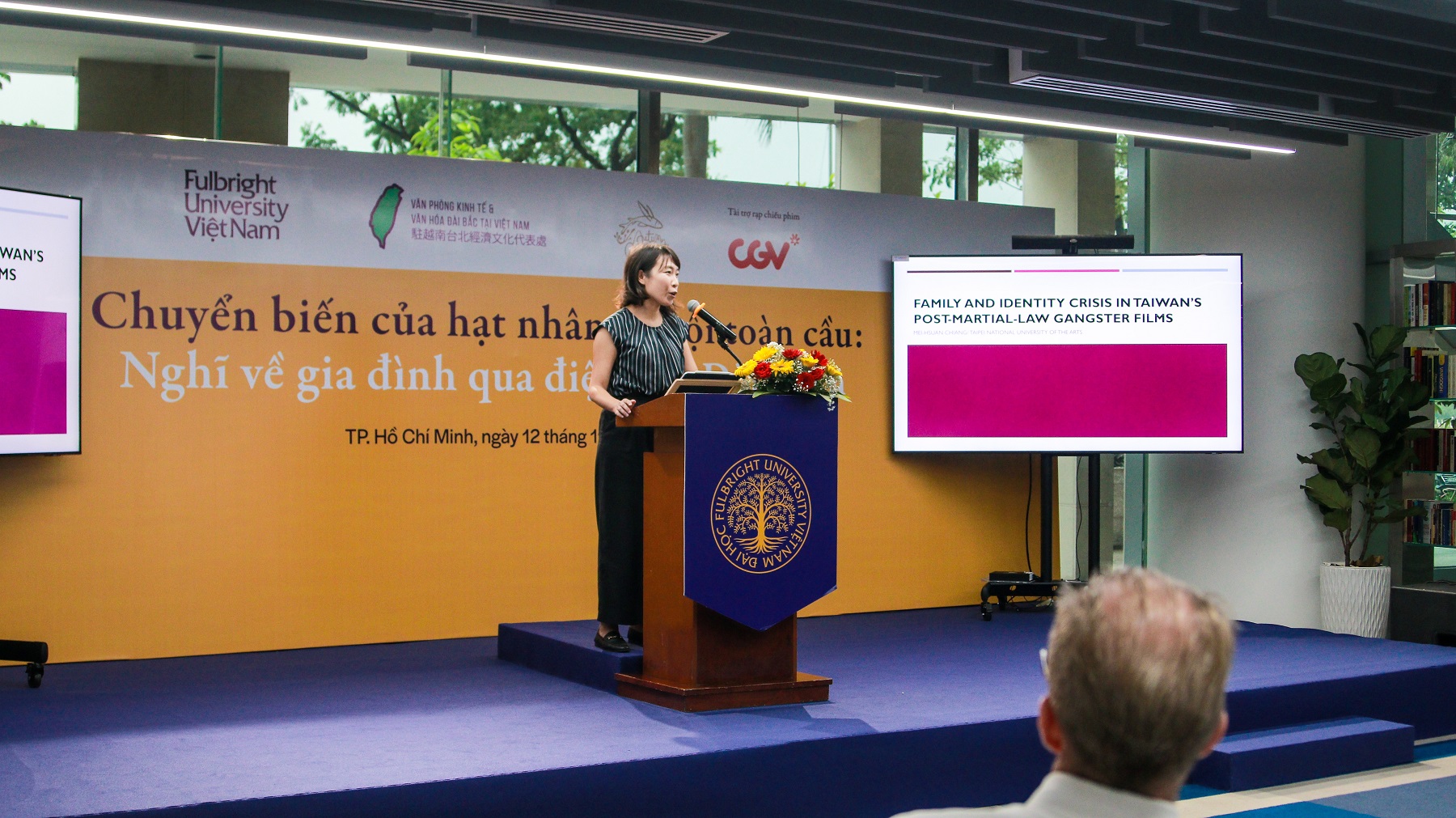
Professor Mei-Hsuan Chiang, The Taipei National University of the Arts, presenting her paper “Family and identity crisis in Taiwan’s post-martial-law gangster films”
In the same vein, Dr. Phuong’s focus is on the movie “A Sun” (2019) by Chung Mong-hong, which, she believes, can help us better understand social violence, criminal commitments, depression, and suicide temptation that young people must confront. Again, located in such brutal conditions, the family plays an important role as a place of refuge protecting and supporting its members against violence and fatal threats.
The dinner table surely stands out as one of the focal points in many films discussed in this conference. As the family’s gathering location where both sides of the same coin, such as sadness and joyfulness, conflicts and consensuses, imperfections and perfections, can be found, the dinner table exposes the family structure in its unceasingly changing conditions, being defective, convertible, or ready to integrate new elements to reconstruct and perfectionate itself.
Through her analysis of Ang Lee’s trilogy “Pushing Hands” (1991), “Eat Drink Man Woman” (1994), and “The Wedding Banquet” (1993), Dr. Phan Thu Van (Ho Chi Minh City Pedagogical University) suggests the filmmaker’s three dramatic structures of the family that require all people involved to talk to each other, and head toward a new balance for the family they live in. Similarly, Prof. Chang-min Yu (National Taiwan University) also recognizes the symbolism of the dinner table in Hou Hsiao-hsien’s “City of Sadness” (1989).

Huynh Quoc Cuong (Ho Chi Minh City Pedagogical University) speaking on Ang Lee’s “Wedding Banquet”
Finally, also focusing on Ang Lee’s “Wedding Banquet,” Huynh Quoc Cuong and Chou Kiet Hoang’s paper (Ho Chi Minh City Pedagogical University) also emphasizes both unavoidable conflicts rooted in different gender viewpoints and potential reconciliations to overcome them.
Obviously, gender issues have become more urgent and occupied a vital position in many papers. Examined from a queer aesthetics perspective, the resistance of gender equality against Confucian gender role models practiced within the traditional family is now widely recognized and clearly shown in Dao Le Na’s paper (University of Social Sciences and Humanities, HCMC).
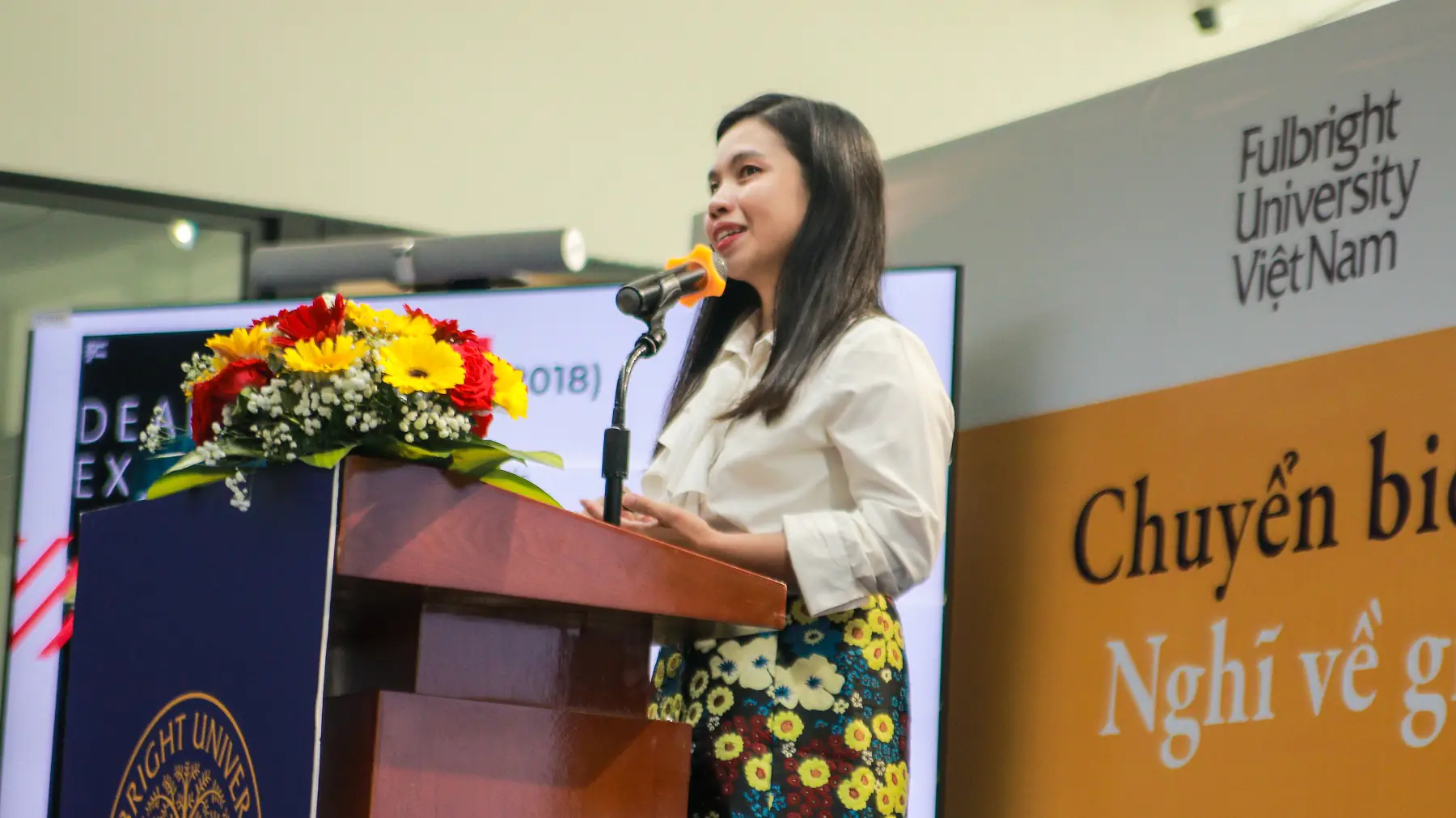
Dr. Đào Lê Na, University of Social Sciences and Humanities, HCMC.
Analyzing the two films “Small Talk” (2016) by Huang Hui-chen and “Cloudy” (2017) by Wang Ming-tai, Tran Ngoc Hieu and Vu Thi Kieu Chinh (Hanoi National University of Education) also reminds us that gender prejudice can happen as a two-way traffic in the relationship between parents and children, and it must be erased by empathy, mutual understanding, and generosity.
Conclusion
The long journey to understand Taiwan and its socio-historical and cultural settings (including its cinema and literature) remain open in front of us; and yet, this conference can be regarded as an auspicious and meaningful start that shall lead to future international collaborations for Fulbright Vietnam University specifically, and Vietnam’s cinema in general.

Dr. Nguyen Nam, Director of Vietnam Studies Center, Fulbright University Vietnam.

Vietnamese director/screenwriter Phan Dang Di

Mr. Hank Han – Director General of Taipei Economic and Cultural Office in Ho Chi Minh City, gave his opening remark.
